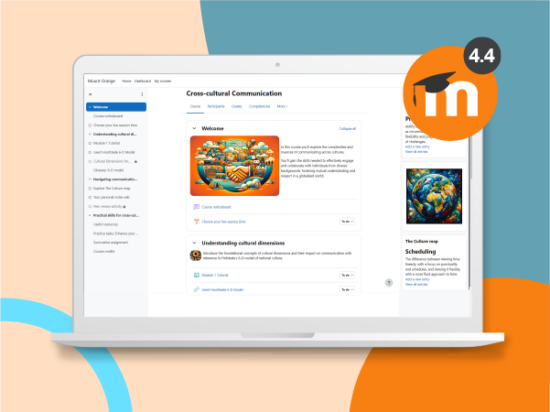Catalina Vieru is a Moodle Administrator, currently working as a Moodle Specialist at the Royal College of Surgeons in Ireland. Catalina has extensive experience managing Moodle sites for different sectors, has worked with Moodle for the past seven years, and is focused on creating quality eLearning content. Lucy Sherwood (Moodle HQ) recently caught up with Catalina to learn more about their use of Moodle and what it’s like to be a Moodle administrator.
Could you tell me a bit about yourself, including your background, interests, and how did you become involved with Moodle?
My background, believe it or not, is not technical – I have a bachelor’s degree in Journalism and communication, a bachelor’s in Psychology, Training and Education and a Master’s in Psychotherapy. When I was living in my native country, Romania, I worked as a psychotherapist and trainer for eight years and as chief editor for a national magazine for about a decade. When I moved to Ireland, seven years ago, I wanted a career change, and I landed into a more technical position (managing a small Moodle for a charity). Being self-taught and working with Moodle, I discovered I actually love digital tools and kept dipping my toes more and more into software and its use in education, which slowly brought me into the Royal College of Surgeons in Ireland (RCSI) IT team, where I’ve been in the Moodle Specialist role for the last three years.
Having a non-technical background really helps me in my Moodle support work, as I understand where the users are coming from, I 100% believe in their ability to understand technical concepts (because I never thought I could, then I did!), and I always encourage people to embrace technology.
I also have an interest in human rights, inclusion and accessibility – which is reflected in my work as well as in my personal life.
Thank you for the background, you are definitely a lifelong learner, which we appreciate at Moodle! I’m curious; what does your Moodle team look like at RCSI?
Our university leans into technology quite a lot, so our IT team is big and diverse. It’s split into smaller teams based on software or projects we specialise in; the Moodle team consists of myself, a colleague for the Dublin campus, and another colleague supporting the Bahrain campus. We all work closely together, have regular online meetings and seek insight and support from one another (or the extended IT team) when we deal with challenging queries or issues.
We also work with an external vendor for upgrades, plugin installations and any code customisations.
What key features or functionalities of Moodle do you find most valuable for your users and why?
Working in academia, our users’ top priority is the student experience, so any changes we make or plugins we install go through this filter first: ‘What can we do to make this better, easier, more fun, and more educational for our students?’ My colleagues and I provide frequent training to our users, who are a mix of operational and academic staff, supporting them with course templates and introducing them to different activities and plugins that benefit their online course delivery.
What has been your experience in integrating Moodle with other software or systems? Which integrations do you use?
RCSI always had an online teaching component, but when the pandemic started, it was all hands on deck to turn all courses into online alternatives. I joined the team in the middle of the pandemic, early 2021, and by that time, the integrations to provide an online experience at the same high quality as before were related to video lectures (Class Collaborate), originality checkers in assignments (Turnitin), video repository (Panopto), polling systems for an interactive class experience (Point Solutions) and similar.
Even though a big part of the campus has returned to primarily on-site learning, these integrations are still being used for accessibility, for example, to allow students access to recorded on-site lectures.
That’s great, we appreciate the uptake in accessible practices in the eLearning world. For us, it’s part of our values and we’re always striving to improve accessibility in Moodle. What is important to you in terms of your focus or passion at the moment?
There’s an increasing focus in our university on Universal Design for Learning (UDL) and accessibility. We are looking at accessibility checkers and supporting staff with designing their courses in a UDL-friendly way. There’s also interest in AI and how the education system can respond to the AI’s growing market, what are the policies we need to have in place, as well as digital tools that should be looked at.
We have definitely noticed an increasing interest in AI and Moodle. As someone who has been using Moodle for seven years, I’m interested in what sets Moodle apart for you when compared to similar software?
I think the open-source aspect is one of its biggest advantages. I love having a community of creative and technically skilled people contributing to one common product, supporting each other with advice and fixes. I raised a couple of tickets in Jira, and when they got solved and fixes deployed with upgrades, I just felt like I was part of something bigger. It’s a generous community.
I’d love to hear about some creative ways in which RSCI has used Moodle. Can you share any projects?
There’s a lot that can be done with Moodle’s basic activities or with some wisely chosen plugins and integrations; in RCSI, we have champions of EDI (Equality Diversity Inclusion), Universal Design for Learning, gamification, VR and simulation, immersive learning, and more.
It can be as simple as creating the space for students to deliver a podcast for their peers or as complex as using immersive technology for hybrid learning when delivering lectures.
Something simple and fun that I am working on in November is an Advent calendar (a beta option in H5P content types) that will have little pieces of training and Moodle guides behind each door. The calendar was launched for staff access on the 1st of December. It’s just a different way of delivering bite-sized Moodle training in a creative way. Maybe it’s not as delicious as surprise chocolate, but close enough!
It was a pleasure to learn more about Catalina and their use of Moodle at RSCI as a Moodle Specialist and Administrator. We appreciate learning more about our users and their applications of Moodle in diverse learning environments, as well as deepening our understanding of their needs and experiences. Thank you, Catalina, and to the RSCI for being part of our thriving Moodle community. To learn more about the Royal College of Surgeons in Ireland, visit their website.




